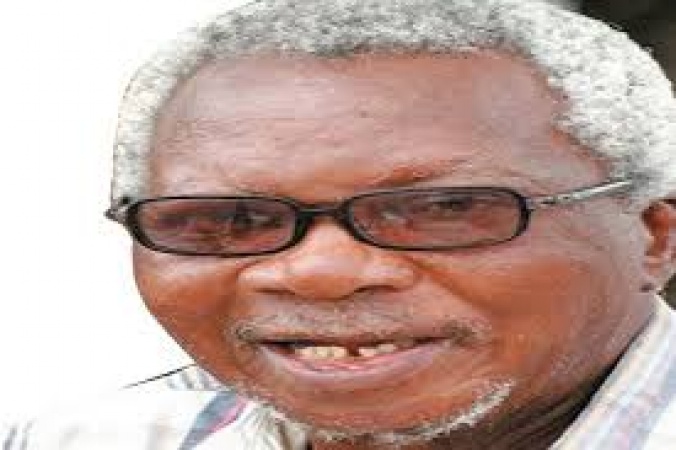By MOLLY KILETE, Abuja
The Defence Headquarters said military operations conducted across the country in the last one week has led to the killings of several terrorists, bandits, oil thieves and other criminals terrorizing the peace of the country.
The Coordinator, Defence Media Organisation, Major General John Enenche, who made the disclosure Thursday, said soldiers operating in conjunction with other security agencies in the North East zone of the country have sustained the tempo in their operational activities with aggressive ground and air operations, clearance operations, cordon and search operations, Intelligence Surveillance Reconnaissance missions as well as artillery and aerial bombardments on terrorists’ hideouts.
He said the the aggressive operations by the troops have stopped the terrorists from moving freely and denied them freedom of action in the zone.
Gen Eneche, at a media briefing, said 16 bandits, gunrunners, drug peddlers and other criminals were arrested within the last one week and 28, kidnapped victims rescued from their abductors.
He also said that several arms, weapons, illicit drugs and other dangerous whiplash used by the criminals were recovered during the period.
‘From the operational estimate of these successes recorded within the period, it is clear that there is downward trend in the activities of bandits in the zone. Troops of the Armed Forces of Nigeria working with other security agencies are committed in their endeavor to end banditry and other sundry crimes in the country,’ he stated.
Giving an update on military operations conducted in the last one week, Enenche said:
‘The Armed Forces of Nigeria and other security agencies have continued their major operations across the country with attendant successes. The various operations have progressed satisfactorily in all the theatres. In this regard, I will be updating you on the operations in line with our weekly schedule. This briefing will cover from 8– 14 October 2020.’
NORTH-WEST ZONE
‘In the North-West zone, the Armed of Nigeria and other security agencies have continued to intensify the operations in their resolve to stamp out banditry and other sundry crimes in the zone. Notably, on 12 October 2020, troops of Operation ACCORD acting on credible intelligence arrested 9 suspected bandits/collaborators at Dan Ali village in Danmusa Local Government Area of Katsina State. Suspects are currently in custody for necessary action. Similarly, in a covert operation based on credible intelligence, 4 suspected bandits including a suspected bandits leader named Mujitafa Shehu were arrested at Kankara Town and Tudu village of Kankara Local Government Area of Katsina State.
‘In another development, troops of Operation SAHEL SANITY deployed at Forward Operation Base Magami while responding to a distress call rescued 23 kidnapped victims from fleeing bandits who abandoned the captives as the unrelenting troops were closing in on their hideout along Zauni-Jengebe road in Gusau Local Government Area of Zamfara State. Preliminary investigation revealed that the victims were kidnapped while on transit to Magami market from Gusau in a passenger bus. All the rescued victims have been reunited with their families.
‘Similarly, Land Component of Operation THUNDER STRIKE supported by the Air Component on 8 October 2020, conducted clearance and rescue operations at Audu Jongom, Jekadarebi, Dutse and Gona-Bature villages as well as adjoining forest in Kaduna State. During the operations, many bandits’ camps were destroyed. In the same vein, 3 kidnapped victims were rescued, 2 suspects arrested, one AK-47 rifle, 2 AK-47 rifle magazines, 73 rounds of 7.62mm special ammunition, one locally fabricated pistol and 3 locally made rifles were recovered among others.
‘Additionally, several armed bandits were neutralized in air strikes executed by the Air Component of Operation HADARIN DAJI at a location West of Wagini in Katsina State. The air interdiction mission was conducted on 8 October 2020 after credible Human Intelligence reports and series of confirmatory surveillance missions had shown significant presence of the bandits, along with hundreds of rustled cattle, in the camp. The attack aircraft subsequently engaged the location in successive runs, destroying portions of the camp and neutralizing scores of the bandits. Currently, Nigerian Air Force helicopter gunship and alpha jet have continued to dominate the air space with aerial patrols providing close air support for ground troops while Intelligence Surveillance Reconnaissance missions have been intensified to deny bandits freedom of action.
‘From the operational estimate of these successes recorded within the period, it is clear that there is downward trend in the activities of bandits in the zone. Troops of the Armed Forces of Nigeria working with other security agencies are committed in their endeavor to end banditry and other sundry crimes in the country.’
NORTH-EAST ZONE
‘Troops of the Armed Forces of Nigeria operating in conjunction with other security agencies in the North East zone of the country have not relented in sustaining the tempo in their operational activities. Between 8 and 14 October 2020, troops conducted series of ground and air operations under Operation LAFIYA DOLE and other subsidiary operations. The operations include aggressive clearance operations, cordon and search operations, Intelligence Surveillance Reconnaissance missions as well as artillery and aerial bombardments on terrorists’ hideoutshttps://googleads.g.doubleclick.net/pagead/ads?client=ca-pub-8540702822458166&output=html&h=280&slotname=1825395178&adk=2494221803&adf=3673058151&pi=t.ma~as.1825395178&w=400&lmt=1602888138&psa=1&guci=2.2.0.0.2.2.0.0&format=400×280&url=https%3A%2F%2Fnewsexpressngr.com%2Fnews%2F108569&flash=0&wgl=1&tt_state=W3siaXNzdWVyT3JpZ2luIjoiaHR0cHM6Ly9hZHNlcnZpY2UuZ29vZ2xlLmNvbSIsInN0YXRlIjowfV0.&dt=1602888137982&bpp=28&bdt=1410&idt=514&shv=r20201014&cbv=r20190131&ptt=9&saldr=aa&abxe=1&cookie=ID%3D18bd38838dd76e35%3AT%3D1602887982%3AS%3DALNI_MbceTlZv0d2s05c_D4djqJ62Dnr3A&prev_fmts=0x0&nras=1&correlator=7446811130642&frm=20&pv=1&ga_vid=2124079428.1596131593&ga_sid=1602888138&ga_hid=1088954846&ga_fc=0&iag=0&icsg=35736454310896&dssz=36&mdo=0&mso=0&u_tz=60&u_his=1&u_java=0&u_h=1280&u_w=800&u_ah=1280&u_aw=800&u_cd=24&u_nplug=0&u_nmime=0&adx=15&ady=3721&biw=800&bih=1160&scr_x=0&scr_y=0&eid=21066819%2C21066973&oid=3&pvsid=3971557531522153&pem=911&rx=0&eae=0&fc=1920&brdim=0%2C0%2C0%2C0%2C800%2C0%2C800%2C1160%2C800%2C1160&vis=1&rsz=%7C%7CpeEbr%7C&abl=CS&pfx=0&fu=8192&bc=31&ifi=1&uci=a!1&btvi=1&fsb=1&xpc=Qp5GtR16xI&p=https%3A//newsexpressngr.com&dtd=562
‘Categorically, own troops forestalled the terrorists’ moves and also denied them freedom of action in the zone, leading to domination of the zone causing some terrorists to flee from the Joint Operations Area. Consequently, there is reduction in the spate of their activities in the North East zone during the period. This is an evidence of own troops superior operational capabilities.
‘The successful feats achieved by the Armed Forces of Nigeria and other security operatives in the North East zone to a large extent is considered to be through the cooperation of the populace. Thus, the High Command of the Military thanks the general public for their support and cooperation and further solicit their cooperation towards providing credible and timely information on terrorists’ activities to facilitate proactive engagements in our operations. The Armed Forces of Nigeria will continue to remain resolute and committed to end the insurgency and terrorism in the North East zone of the country.’
NORTH-CENTRAL ZONE
‘In the North Central zone, the Armed Forces of Nigeria have continued to sustain the tempo through aggressive clearance patrols, ambushes and raids which have yielded remarkable successes. Within the period under review, troops of operations WHIRL STROKE and SAFE HAVEN conducted major raid operations to identified bandits camps. Notably, on 13 October 2020, following credible intelligence on the activities of the criminal elements linked to the late Gana, troops of Sector 2, Operation WHIRL STROKE raided a suspected armed militias’ hideout at Bem Akumaoir village of Katsina Ala Local Government Area of Benue State. Troops had contact with the armed bandits and overwhelmed them with superior firepower, neutralizing one militia while others fled into the surrounding bushes with fatal injuries. One locally made pistol loaded with one round of 7.62mm ammunition and one Mobile Police jersey pullover were recovered.
‘Earlier, on 9 October 2020, sequel to intelligence reports on the activities of 3 gunrunners at Mangoro general area in Niger State, troops mobilised to the area and arrested one of the suspects, Juli Umaru. It was revealed that the 3 suspected gunrunners cumulatively possessed about 60 AK-47 rifles. The suspect was taken into custody for preliminary investigation, while efforts are on-going to apprehend the other suspects and recover the weapons in their possession.
‘Relatedly, troops of Operation SAFE HAVEN, in conjunction with personnel of NDLEA, raided a suspected drug peddlers’ hideout at Abun and Gimbi villages in Wase Local Government Areas of Plateau State. The operation resulted in the arrest of 2 suspected drug dealers with a large quantity of substances suspected to be Cannabis Sativa and other illicit drugs. Suspects and exhibits have been handed over to the NDLEA for further action.
‘Furthermore, on 11 October 2020, troops of Operation SAFE HAVEN intercepted suspected armed cattle rustlers around Katran Forest in Riyom Local Government Area of Plateau State. The aggressive tactics of the troops resulted in the recovery of 50 rustled cows while the criminals fled with fatal gunshot injuries. The recovered cows were duly handed over to their legitimate owners.
‘As part of concerted Civil Military Cooperation activities, Headquarters of Operation WHIRL STROKE, on 9 October 2020, fostered several peace meetings amongst the various ethnic groups in Benue and Nasarawa States. Notably, peace and security meetings were held at Adaka in Makurdi Local Government Area, Anguwa and Jimba in Gwer West Local Government Area and Gbeji in Tsaav Local Government Area of Benue State. The meetings were attended by various stakeholders in the area.
‘Additionally, on same 9 October 2020, Headquarters Operation WHIRL STROKE conducted a medical outreach at Internally Displaced Persons (IDPs) Camp at Anyin Community in Loko Town, Nasarawa Local Government Area of Nasarawa State. Several items including mosquito nets were distributed to the IDPs while also reassuring them of their safety. Troops also visited Umenger Community Primary School where items including exercise books, pencils, ball pens as well as refreshments were distributed to the students. The medical outreach was also extended to Awe and Keana Local Government Areas of Nasarawa State. Teaching aids including books and pens were equally donated to the pupils at Tunga Central School in Awe Local Government Area of Nasarawa State, while items such as noodles, diapers, disinfectants, detergents and other toiletries were distributed to individuals at the Primary Healthcare Centre at Giza in Keana Local Government Area of Nasarawa State.
‘Still on 9 October 2020, Headquarters Operation WHIRL STROKE conducted a Security Awareness campaign at Loko Town in Nasarawa Local Government Area of Nasarawa State. The campaign was aimed at educating the local community on the need to provide troops with information on movement of criminals in the general area.’
SOUTH-SOUTH ZONE
‘Troops of Operation DELTA SAFE have continued with the aggressive fight against economic sabotage in the zone with significant successes. Within the period under review, following actionable intelligence on the activities of oil thieves, Nigerian Navy Ship DELTA patrol team intercepted and immobilized 2 large wooden boats laden with polythene bags cumulatively containing about 20,000 litres of suspected illegally refined Automotive Gas Oil (AGO) at Jeddo in Delta State. The team also destroyed 4 drums and 75 polythene bags containing illegally refined AGO by the riverbank at Jeddo. Further exploitation of the general area led to the destruction of 600 drums and recovery of 2 pumping machines hidden in several wooden stores at Jeddo. Additionally, the operation led to the arrest of 2 suspected vandals around Shagbolor in Warri South Local Government Area. The suspects and recovered items were taken into custody for further action.
‘Also within the period under review, troops of 29 Battalion in conjunction with personnel of Nigeria Security and Civil Defence Corps and Labarador Security workers discovered and immobilized 3 illegal refining sites and one wooden boat loaded with illegally refined AGO around Bekinkiri/Ke in Degema Local Government Area of Rivers State. Similarly, still on 8 October 2020, troops of Sector 2 Operation DELTA SAFE acting on credible intelligence arrested 4 suspected pipeline vandals at Opukushi Community in Ekeremor Local Government Area of Bayelsa State. In the same vein, troops of 222 Battalion, on 9 October 2020 arrested 2 suspected pipeline vandals from Ughelli Community in connection with the theft of some parts of the Oil Mining License (OML) 34 oil wellheads, in Ughelli North Local Government Area of Delta State. The suspects were handed over to Sector 1 Operation DELTA SAFE for further action.
‘Later in the week, Operation CALM WATERS 2 and Operation SWIFT RESPONSE recorded remarkable successes. Specifically, on 12 October 2020, Forward Operating Base IBAKA gunboats while on routine patrol around Utan Iyata Creek intercepted and arrested a medium size wooden boat laden with 978 bags of 50 kg foreign parboiled rice with 2 suspects. Preliminary investigation revealed that the foreign parboiled rice was suspected to be smuggled from the Republic of Cameroun. Also, a truck laden with about 2,195 cartons of Cocoa Butter and a motorcycle were arrested. Suspects and items recovered from the arrest are currently in custody and will soon be handed over to the appropriate prosecuting authority.
‘Gleaning from the foregoing, the Armed Forces of Nigeria and other security agencies remain committed, resolute and determined to curtail the activities of insurgents, armed bandits, economic saboteurs and other criminal elements in the country. The Military High Command commends the gallant troops for the successes achieved so far and their unwavering commitment and dexterity. Troops are further encouraged to remain resolute and decisive in curtailing the activities of the enemies of the country. The High Command, also reassures the general public of its commitment in securing the country. Members of the general public are enjoined to continue providing timely information on the activities of criminals in their various localities to the nearest military and other security agencies location for prompt action.’ (Daily Sun)











